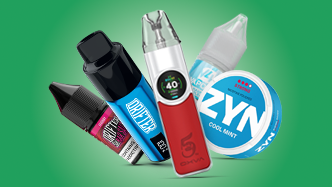Vaping is often making headlines thanks to a lot of misinformation and scaremongering by the media and anti-vaping groups. Whilst it’s still relatively new, having only been widely accessible in the UK since 2007, early studies have been promising.
As more research into the long-term effects of vaping continues to be published, we are getting closer to having concrete evidence on the safety of vaping. Understandably, many smokers want to know how safe vaping is and what it does to the body before they make the switch.
A study in 2020 found that over a third of UK smokers wrongly believe that e-cigarettes are equally or more harmful than combustible tobacco. This is most likely due to misinformation in the media and dramatic headlines in the tabloids. Over 100,000 lives are lost each year in Britain due to smoking related diseases, so it’s really important that we separate the facts from fiction to help people make healthier choices.
We are not medical professionals. Whilst the information in this article is taken from governing bodies and organisations such as the NHS, Cancer Research UK and the British Heart Foundation, you should always consult your GP regarding your health and wellbeing. If you’re looking to quit smoking, you should ask your doctor for advice on what might be the best options for you, especially if you have pre-existing health conditions.
Is vaping bad for you?
E-cigarettes are not completely risk free, but they are far less harmful than smoking. They don’t produce tar or carbon monoxide, two of the most harmful chemicals found in cigarette smoke. In the UK, e-liquids and vape devices are tightly regulated to ensure safety and high quality, preventing the use of harmful chemicals and limiting the size of tanks, pods and bottles.
A lot of people worry about the effects of nicotine, but whilst it’s an addictive substance, nicotine is relatively harmless. According to the BHF, it is not a significant health hazard for people without heart conditions.
It doesn’t cause acute cardiac events or coronary heart disease, and is not carcinogenic, so it doesn’t have the potential to cause cancer. But nicotine can be a problem for people with heart disease, as it raises the heart rate. If you do have other medical conditions, always speak to your GP first before you make the switch to e-cigarettes.
It’s always better to quit smoking completely, and if you don’t already smoke then you shouldn’t take up vaping. However, vaping is at least 95% safer than smoking, so it’s an alternative that should definitely be considered, especially if you’ve tried and failed to quit before.
You will not feel the full benefits from vaping unless you cut out cigarettes completely, so it’s important that you find a device and e-liquid that works for you. Your local vape shop will be able to help you out with this. At 888 Vapour, we offer a wide range of starter kits and vape juice to help you find your perfect match. Just pop in to one of our stores, where our friendly and knowledgeable team will be happy to advise you.
Are vape devices medically licensed?
No, there are currently no medically licenced vape kits in the UK. There have been calls for the MHRA to approve the licensing of e-cigarettes, as this would mean that ex-smokers could be prescribed them on the NHS, helping more people quit smoking.
Whilst e-cigarettes are far cheaper than cigarettes, making them available for prescription would help improve access, especially for those on low-incomes. It would also help dispel any myths surrounding the safety of vaping, as speaking to a GP would reassure patients that it’s a much safer alternative.
However, medically licencing vape products could lead to less choice. It also places the smoker’s ability to switch in the hands of their GP or a smoking cessation professional. This can be quite disempowering and might put people off transitioning to e-cigarettes.
Is vaping addictive?
Yes, most e-liquids contain nicotine, which is a highly addictive substance. This is the chemical that keeps you hooked on cigarettes, and whilst it’s relatively harmless, it will also get you addicted to e-cigarettes.
The good thing about vaping is that you can choose your nicotine strength. You can pick from several concentrations in order to find something that satisfies your cravings, before steadily decreasing your intake over time if you want to.
If you want to cut out nicotine completely but you’re not ready to give up vaping, you can buy nicotine-free e-liquids, most commonly available in the form of shortfills. Usually, you buy nicotine shots, which you add to your shortfills to create your desired nicotine strength. You can just leave these out, but the flavour will be a lot stronger.
If you want to dilute the flavour and get the most juice for your money, you can choose our nicotine free shots, which will give you a full shortfill of 0mg nicotine vape juice.
Does vaping cause popcorn lung?
Bronchiolitis Obliterans, commonly known as popcorn lung, is a rare type of lung disease that first made headlines a few years ago. It was discovered that a likely cause of popcorn lung is diacetyl, a chemical which used to be used in some e-liquids.
Diacetyl is a banned ingredient in e-liquids in the UK, so as long as you’re buying your vape juice from a reputable retailer, you don’t need to worry about developing popcorn lung.
Does vaping stain teeth?
No, vaping does not stain your teeth. Unlike cigarettes, e-liquid doesn’t contain tar, the main chemical responsible for the yellowing of your teeth when you smoke.
Some poor-quality vape juices might contain coloured food flavourings that could stain your teeth. Check the ingredients before you buy, but as long as you’re shopping in a reputable store, your e-liquids won’t contain anything that could stain your teeth.
Does vaping make you sweat?
Nicotine causes an increase in heart rate, blood pressure and therefore your body temperature, activating the sweat glands. Those who already sweat a lot might experience aggravated symptoms when smoking or vaping, so if it’s something you’re worried about then you should consider reducing your nicotine strength.
The other harmful toxins found in cigarette smoke put more pressure on the heart, arteries and blood vessels on top of the effects of nicotine, so switching to vaping will improve your health and should mean you don’t sweat as much as your body starts to recover.
Do vapes set off fire alarms?
It’s possible, but unlikely. Most modern fire alarms are designed to differentiate between smoke from a fire and vapour to avoid false alarms. For example, your fire alarm doesn’t go off every time you boil the kettle.
Heat alarms, the type most commonly used in kitchens, are the least likely to detect vapour as they respond to heat rather than smoke. Places like hotels often have more sensitive fire alarms than the ones in your home, and many have strict rules against vaping anyway. If you accidentally set the alarm off in your hotel room, you could face a hefty fine, so check the rules before you start vaping.
How to stop vaping
You’re probably wondering why a vape shop is advising you on how to stop vaping, but it would be irresponsible of us to promote the use of e-cigarettes over quitting smoking completely.
Vaping too often or with too high a nicotine strength can cause headaches and nausea, so decreasing your intake will help. Try steadily transitioning down from the very high strengths by switching between a lower concentration. You can also use nicotine gum and patches if you’re getting cravings in between vapes.
For many, the action of smoking or vaping is what keeps people hooked, so fidget spinners and stress balls can help with not having your vape in your hand anymore. Quitting smoking is a difficult task anyway, so don’t put pressure on yourself to give up vaping too quickly. At the end of the day, if your e-cigarette helps you stay off tobacco for life, then it’s better to keep vaping rather than reverting back to cigarettes if you feel tempted.
Again, we aren’t medical professionals. If you’re worried about the side effects of switching to vaping, speak to your GP first about your medical history to make sure it’s the right option for you.



















